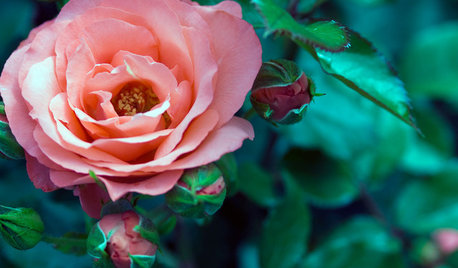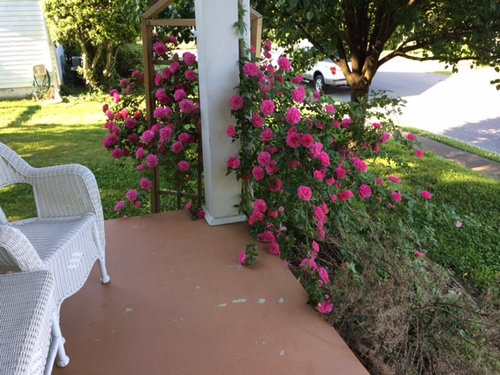Question about rose rosette virus
quiltkitty (Mid TN - zone 7a)
8 years ago
last modified: 8 years ago
Featured Answer
Comments (27)
Sheila z8a Rogue Valley OR
8 years agoquiltkitty (Mid TN - zone 7a) thanked Sheila z8a Rogue Valley ORquiltkitty (Mid TN - zone 7a)
8 years agoRelated Discussions
new Clemson rose rosette virus article
Comments (1)my co-worker's mother makes $70 hourly on the laptop. She has been without a job for seven months but last month her income was $12724 just working on the laptop for a few hours. Read more on this site http://bit.ly/19FdhC3...See MoreAnn Peck to talk about rose rosette virus at Salisbury, NC
Comments (1)Be nice if someone recorded it placed on web....See MoreFirst report of rose rosette disease caused by Rose rosette virus on K
Comments (6)I added what I had on Friday. I can see the addition, but it was never recorded in the number of posts???? Title: "First report of rose rosette disease caused by Rose rosette virus on Knock Out roses in Louisiana." Author(s) : Singh, R.; Valverde, R.; Cook, M.; Owings, A. Author Affiliation : Department of Plant Pathology and Crop Physiology, Louisiana State University Agricultural Center, Baton Rouge, LA 70803, USA. Author Email : rsingh@agcenter.lsu.edu Journal article : Plant Health Progress 2016 No.August pp.PHP-BR-16-0022 ref.1 Abstract : " To the authors' knowledge, this is the first report of rose rosette disease caused by Rose rosette virus on Knock Out roses in Louisiana. It is difficult to assess the total value of roses in Louisiana but this disease has the potential to negatively impact the thriving rose industry in the state."...See MoreQuestion about Rose Mosaic Virus
Comments (51)comtessedelacouche (10b S.Australia: hotdryMedclimate) I started each post to you with the following qualifier: "since you are from Australia, you may find these links of use:" Please notice the use of "you may find". I suggest that if you find something in the links that you are interested in obtaining addition information / viewpoints about, that you start a new thread on that point. If your rose growing skills are anything like what I saw illustrated in the annual, congratulations!...See MoreSheila z8a Rogue Valley OR
8 years agoquiltkitty (Mid TN - zone 7a) thanked Sheila z8a Rogue Valley ORbraverichard (6a, North MO)
8 years agoquiltkitty (Mid TN - zone 7a) thanked braverichard (6a, North MO)quiltkitty (Mid TN - zone 7a)
8 years agoquiltkitty (Mid TN - zone 7a)
8 years agonikthegreek
8 years agolast modified: 8 years agoSheila z8a Rogue Valley OR
8 years agoquiltkitty (Mid TN - zone 7a) thanked Sheila z8a Rogue Valley ORbraverichard (6a, North MO)
8 years agoquiltkitty (Mid TN - zone 7a) thanked braverichard (6a, North MO)quiltkitty (Mid TN - zone 7a)
8 years agobraverichard (6a, North MO)
8 years agoquiltkitty (Mid TN - zone 7a) thanked braverichard (6a, North MO)quiltkitty (Mid TN - zone 7a)
8 years agoquiltkitty (Mid TN - zone 7a)
8 years agobraverichard (6a, North MO)
8 years agoquiltkitty (Mid TN - zone 7a) thanked braverichard (6a, North MO)quiltkitty (Mid TN - zone 7a)
8 years agoquiltkitty (Mid TN - zone 7a)
8 years agolast modified: 8 years agoquiltkitty (Mid TN - zone 7a)
8 years agoquiltkitty (Mid TN - zone 7a)
8 years ago
Related Stories

GARDENING GUIDESWhat Kind of Roses Should You Grow?
Want to add the beauty of roses to your garden? Find out which ones, from old-fashioned to modern, are right for you
Full Story
GARDENING GUIDESLearn the Secret to Bigger and Better Roses
Grow beautiful roses using both ordinary and unusual soil amendments
Full Story
WINTER GARDENINGPruning Secrets for Exquisite Roses
Encourage gorgeous blooms year after year with this time-tested advice on how to prune your rosebush in winter for health and shape
Full Story
GARDENING FOR BUTTERFLIES3 Ways Native Plants Make Gardening So Much Better
You probably know about the lower maintenance. But native plants' other benefits go far beyond a little less watering and weeding
Full Story
HOUZZ TV FAVORITESHouzz TV: See How Early Settlers Lived in This Restored Pilgrim House
Passionate restoration and preservation efforts give a 1665 home an honored place in the present
Full Story
EARTH DAYGrow a Beautiful Garden With Ecofriendly Greywater
Reducing home water waste means lower bills and a healthier planet. Here's how to set up a greywater home irrigation system that can help
Full Story
DECORATING GUIDES10 Ways to Update a Victorian Living Room
Bring your period living room sensitively into the 21st century with these simple yet effective design tricks
Full Story
LIFEHow to Outsmart Backyard Critters
Learn to think like a raccoon, skunk or squirrel to keep your home safe and your garden intact
Full Story
FARM YOUR YARDHello, Honey: Beekeeping Anywhere for Fun, Food and Good Deeds
We need pollinators, and they increasingly need us too. Here, why and how to be a bee friend
Full Story
MOST POPULAR8 Backyard Ideas to Delight Your Dog
Cue the joyous soundtrack. These pet-friendly landscape and garden ideas will keep your pooch safe, happy and well exercised outdoors
Full Story



Patty W. zone 5a Illinois